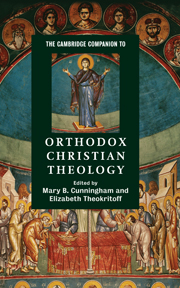Book contents
- Frontmatter
- Who are the Orthodox Christians? A historical introduction
- Part I Doctrine and Tradition
- 1 Scripture and tradition in the Church
- 2 Biblical interpretation in worship
- 3 God in Trinity
- 4 Creator and creation
- 5 The human person as image and likeness of God
- 6 Christ and salvation
- 7 Eschatology
- 8 The Church
- 9 Theology of the icon
- 10 The spiritual way
- Part II Contemporary Orthodox Theology: its Formation and Character
- Glossary
- Bibliography
- Index
- Series list
1 - Scripture and tradition in the Church
from Part I - Doctrine and Tradition
Published online by Cambridge University Press: 28 March 2009
- Frontmatter
- Who are the Orthodox Christians? A historical introduction
- Part I Doctrine and Tradition
- 1 Scripture and tradition in the Church
- 2 Biblical interpretation in worship
- 3 God in Trinity
- 4 Creator and creation
- 5 The human person as image and likeness of God
- 6 Christ and salvation
- 7 Eschatology
- 8 The Church
- 9 Theology of the icon
- 10 The spiritual way
- Part II Contemporary Orthodox Theology: its Formation and Character
- Glossary
- Bibliography
- Index
- Series list
Summary
From an Orthodox perspective, scripture, tradition and Church are viewed as a comprehensive unity with interdependent parts. Scripture finds its centre in the mystery of the eternal Christ, veiled in the Old Testament and revealed in the New. Tradition in its theological substance is defined by the gospel, the sum of scripture's saving message - namely, the good news of God's saving work in Christ and the Spirit by which the powers of sin and death are overcome and the life of the new creation is inaugurated, moving towards the eschatological glorification of the whole cosmos. The Church itself, the ongoing living community of God's people, far from being a mere historical appendage, is the body of Christ and the temple of the Holy Spirit, constitutive of revelation. As such, the Church forms the very ground from which scripture and tradition emerge and together, in turn, make up a coherent source of revelation, the supreme norm for the life of the Church.
THE NATURE OF SCRIPTUREo
To know the nature of the Bible is to acquire insights into its origins, contents, character, purpose and saving value. In terms of divine inspiration, the primary author of scripture is God himself. Scripture represents God's 'oracles' or sacred words (logia theou, Romans 3:2). St Justin Martyr (around AD 150) cited many of the Old Testament texts (the New Testament had not yet fully been established) with the words 'God speaks' or 'God says' as the immediate speech of God. The later Church Fathers continued this tradition and viewed the entire corpus of scripture, Old and New Testaments, as directly inspired by God and disclosing God’s express will. On that basis, because God is the main actor both behind and in the Bible, the Orthodox tradition advocates the supreme authority and primacy of scripture.
- Type
- Chapter
- Information
- The Cambridge Companion to Orthodox Christian Theology , pp. 21 - 34Publisher: Cambridge University PressPrint publication year: 2008
- 7
- Cited by



